A mobile app reseller program is an excellent way for agencies to add value to their clients and generate recurring revenue. But sometimes getting your program off of the ground can be challenging.
I’m sure you’ve researched all of the benefits and reasons to become a mobile app reseller, so why isn’t the program working?
One thing is for sure—the demand is there, and it’s not going anywhere. Individuals and businesses alike are want to build apps. They are just looking for the right partner to accommodate their needs.
Even if you’re off to a slow start, there are some quick ways to fix your reseller program.
As someone who has been building, selling, and marketing app development for the better part of my entire career, I know what it takes to succeed in this space.
I’ve identified some of the most common problems with agency reseller programs and how to fix them. You can use this guide to identify potential problems with your current offering and make the necessary adjustments to have a profitable white label mobile app reseller program.
1. No Marketing Plan
Reseller programs can fail if they aren’t marketed properly. You could have the best product or service in the world, but it’s useless if nobody knows about it.
Generally speaking, becoming a white label reseller doesn’t require a huge upfront investment. But you still need to put some money into marketing your services.
You can’t expect clients to come find you or stumble upon your website by accident. You’ve got to put yourself out there and develop a complete marketing plan for your mobile app development services.
For this type of service, the majority of your marketing strategy should be digital. You’re probably not going to print flyers, run radio ads, or put up billboards.
Invest in a mix of both inbound and outbound marketing tactics.
The B2B technology space is a highly competitive industry. A recent study highlights the top reasons why marketers in this space are increasing their budgets.
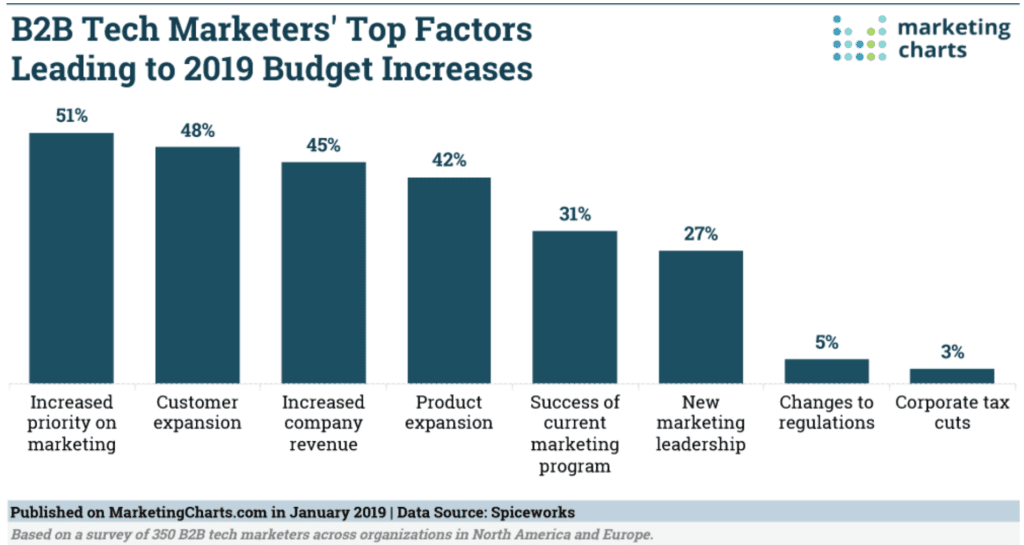
As you can see, an increased priority in marketing ranks first on this list. Customer expansion and product expansion both fall within the top four factors.
If other companies out there are spending more money on marketing, and you’re not, how can you expect to compete?
Even if you’re operating on a tight budget, there are still plenty of cost-effective marketing tactics that you can be using.
Increase your blogging frequency and prioritize SEO. Create video content to explain how your app development program works. Take advantage of social media, email marketing, and other low-cost, high ROI tactics.
For those of you who have been marketing your service but still haven’t found success, it might be time to-revaluate your strategy. Switch up your campaigns and advertising channels, if necessary. Just make sure that you have a clear plan in place.
2. Wrong Pricing Strategy
One of the best parts about being a white label reseller is the ability to set your own prices. You’ll usually pay a fixed rate for the platform you’re using, and the reseller profits can be as high or as low as you determine.
But your prices can make or break the success of your services.
If you set your prices too high, people might be unwilling to pay. If you set them too low, prospects might think the quality is subpar. You need to find that sweet spot that’s the perfect medium between the two.
How did you come up with your pricing strategy? Believe it or not, most agencies can’t answer this question. If you pulled your numbers out of thin air, then it’s unlikely that you guessed the perfect figures.
You need to do some research to see what people are actually willing to pay for the app development services that you’re proving.
My recommendation is to offer tiered pricing based on features and functionality. It should look something like this:
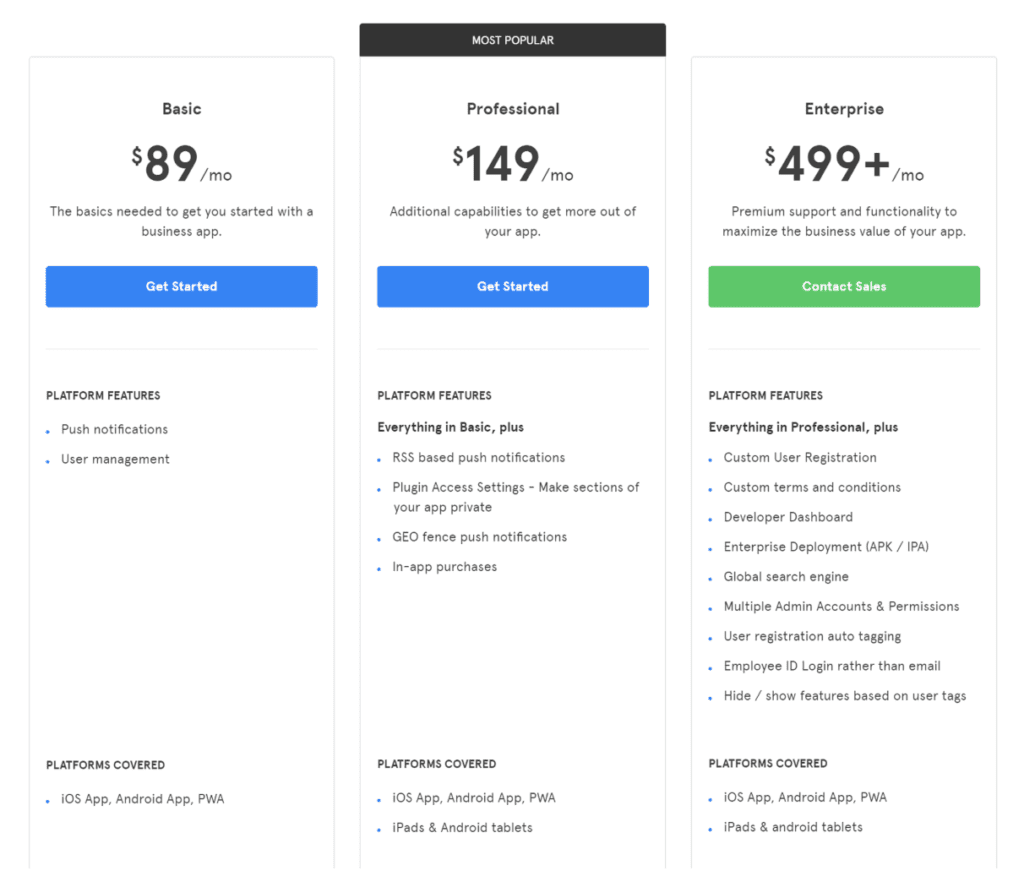
These plans will accommodate the needs of a wide range of potential customers. From individuals to large-scale corporations, there’s an option for everyone.
You can also offer incentives for long-term commitments. For example, the price per month should be higher in a month-to-month plan than an annual commitment.
What would you rather get? $200 a month for two months or $150 per month for 12 months? Obviously, you’d choose the latter.
Your pricing should also be based on your target market. For example, a Fortune 500 company will likely have greater spending power than a college student. We’ll talk more about figuring out who to target as we continue.
3. Failure to Identify the Right Target Market
Who is your app development service for? If you said, everyone—that’s the wrong answer.
This is an agency reseller mistake that I see all of the time. They are convinced that their offering is for everyone and anyone. So their marketing plan and pricing strategy (both previously discussed) are in no man’s land.
I know what some of you are thinking. Anyone can build an app, right? That’s true, but that doesn’t mean that everyone should be targeted.
With that same logic, everyone who eats food should be targeted by McDonald’s. Or anyone who wears clothes should be targeted by Gucci. That’s not the case for either scenario.
There is no such thing as a marketing campaign that’s designed for everyone. So if you don’t have a clearly defined target audience, your marketing efforts will suffer.
You should be able to describe exactly who you’re targeting with a reseller program. These are the components of a target market.
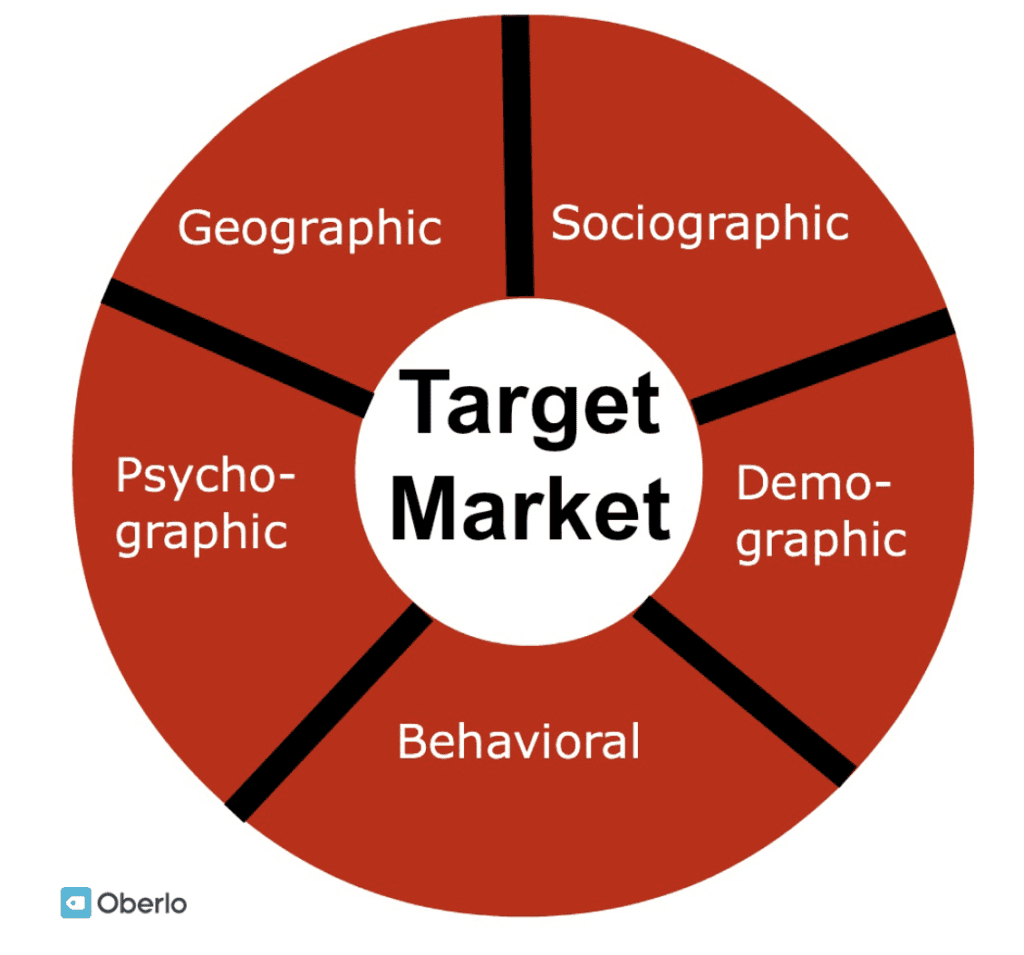
It’s impossible to accommodate the needs of prospective clients if you don’t know who they are. You’ll struggle to reach them in your marketing efforts as well.
For example, let’s say you’re targeting small to mid-sized enterprises (SMEs).
If you’re running social media ads on platforms like Instagram, Snapchat, or TikTok, you’re essentially lighting money on fire. Nobody in your target audience is going to see those. Even Facebook would be borderline in this scenario.
To target SMEs via social media, you’d need to create highly targeted ads on LinkedIn, aimed at CTOs and CMOs.
Your marketing strategy and would look very different if you were targeting small business owners instead.
If you haven’t taken the time to properly identify your target and understand their needs, it could be the reason why you’re having problems with your marketing campaigns and pricing strategy.
4. You Don’t Have a Niche
I’ve heard people say that the difference between target market and niche is just semantics. But that couldn’t be further from the truth. Once you’ve identified a target audience, you can take that one step further by carving out a niche.
Let’s continue using my previous example of targeting SMEs. The person of interest at those organizations would be different depending on the type of app they want to build.
For example, if they wanted to develop a human resources app, you’d likely be dealing with the CTO. But if they want to build an app to improve the customer experience, you’d probably be dealing with the CMO or director of marketing.
You can get even more specific in that space as well. Maybe you specialize in a particular industry, like healthcare, manufacturing, retail, or food and beverage.
How do you find your niche? Look to your existing clients. If your agency has been around for a while and offers other services, what types of businesses or people have you been working with? If 90% of your current clients are small business retailers, then that’s your area of expertise.
For those of you starting a mobile app reseller agency from scratch, look to your own background to come up with a niche. Maybe you have a legal background—target law firms. Or maybe you have a fitness background—target gym owners and personal trainers.
This will be much easier than trying to target hospitals without any knowledge of the healthcare industry. So stick with what you know best first, and then branch out from there.
5. You’re Not Nurturing Leads
Your mobile app development service won’t necessarily sell itself. But once you’ve identified your target market and niche, it’s easier to align your marketing strategy with your sales strategy.
Understand that there are two forces occurring simultaneously. You are trying to sell while your leads are interesting in buying.
But those leads must be nurtured through the buying process. Just because someone lands on your website or gives you their contact information, it doesn’t automatically mean that they’re going to convert.
Even if they’re interested in what you’re offering, finalizing the sale usually takes a bit more convincing.
Take a look at the different stages of the B2B sales funnel.
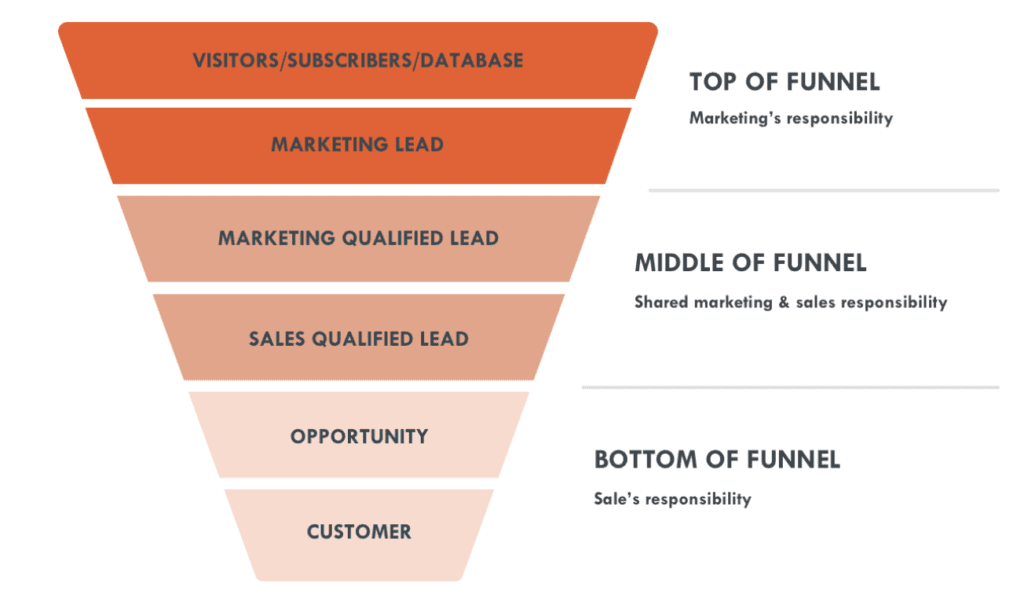
The content required to reach a prospect at each stage of the journey will vary depending on where they fall within the funnel.
For example, a landing page with some basic information about your mobile app services would be a top of the funnel campaign strategy. This page could include some client testimonials and clearly explain who would benefit from your services.
If that person fills out a lead-gen form, provides their email address, or sets up a discovery call, they’ll move down the funnel. Now you can provide them with additional information in the form of whitepapers, case studies, or something along those lines.
Continue with follow-up calls and emails to qualified leads.
Most people don’t land on a website on a whim and commit to spending hundreds or thousands of dollars per month for the next few years without taking some time to think about it.
Consider hiring a dedicated sales manager or put someone in charge of this process if you don’t have a strong background in sales. Having highly effective closers will be crucial to your success.
6. Unprofessional Website
This is another common problem that I see with mobile app reseller programs that aren’t working. You could be the top expert in your niche and give away gold for free, but if your website doesn’t look good, it’s going to kill your program.
We live in a day and age where you can’t afford to have this issue. People will judge your brand before they even know what you’re offering.
It takes just 50 milliseconds for visitors to form an opinion about your website. That first impression will be a driving force behind their decision to do business with you.
Take a look at these statistics about web design:
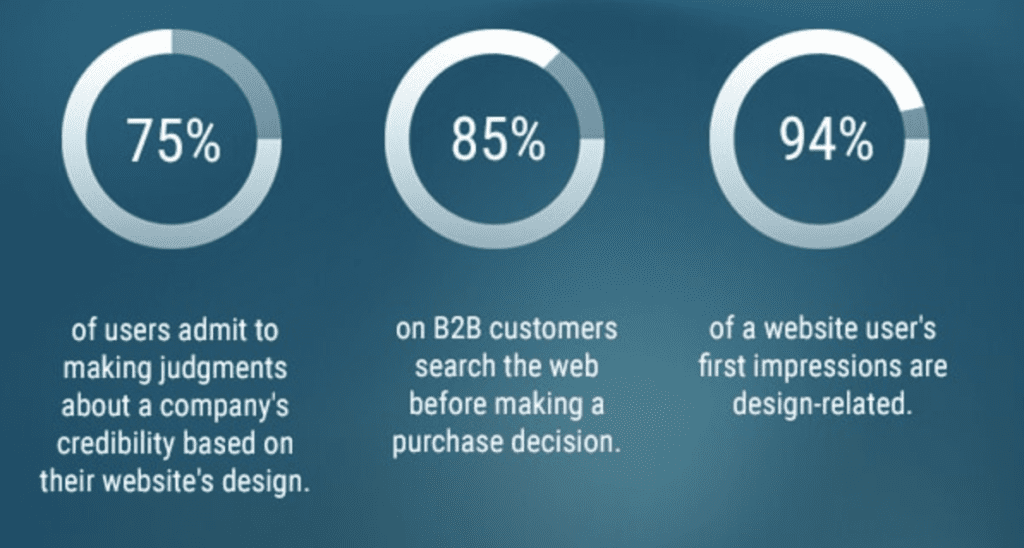
Over 90% of first impressions are related to the design of a website. Nearly eight out of ten people will judge your brand’s credibility based on that design.
In short—your website can make or break your reseller program.
If the site is full of ads, clutter, flashing lights, and other spam-like promotions, people won’t want to work with you. If the site loads slowly and looks like it hasn’t been updated in the last decade, you’ll struggle to sign clients.
We all know what a credible website looks like. And we most certainly know what bad websites look like.
Follow the formula from global leaders like Apple. Keep your site simple, clean, and professional.
Use open space to your advantage. Make sure it has a simple navigation. Your services should be clearly defined with a CTA visible at all times.
Monitor the analytics of your site as well. This information could give you a clear indication of how people feel when they land on your pages. If you have a high bounce rate, it’s time to go back to the drawing board and consult with a professional web designer.
7. You’re Using the Wrong White Label Reseller Platform
Sometimes the product itself is the problem with your reseller program.
Even if you’ve done everything else right, this could crush your agency’s chances of success. You have a great marketing strategy. You’ve identified your target market and carved out a niche. You have an effective sales strategy, and your website is top-notch. But the actual service is no good.
Your clients will eventually find out if the app development platform doesn’t meet the standard they were anticipating.
If they don’t figure it out in the free trial or demo, they’ll quickly learn once they start using it.
There is no substitute for quality. This is definitely not something that you can fake. So don’t choose a white label reseller platform just because it has the lowest prices and gives you the potential for higher profit margins. That won’t be helpful if nobody signs up or everyone is canceling after one month of use.
The best reseller programs need to benefit your clients just as much as they benefit you.
Use a program that has lots of out of the box functionality. The platform should be easy enough for anyone to use, even if they don’t have any experience with development.
Your program should support iOS, Android, and PWA (progressive web apps). There should be unlimited customization, as well.
If your clients feel limited, restricted, or just can’t build what they anticipated with your current platform, it’s probably time for you to shop around for another mobile app reseller platform.
8. Poor Customer Service
In a perfect world, your clients will sign up for your reseller program, pay forever, and you’ll never hear from them again. But you and I both know that’s not realistic.
People are going to have questions and need assistance, especially when it comes to using technology and building a mobile app.
Agencies that can provide excellent customer service will have a massive advantage in this space. But failure to provide quality service will cause you to lose customers.

Furthermore, 86% of people are willing to pay more money for a better customer experience.
The level of customer support you’re able to provide has a direct correlation to our last point about choosing the right reseller platform.
The best mobile app reseller platforms will provide you with excellent support, so you’re able to pass those benefits along to your customers.
For example, you need to know how the platform works yourself. Otherwise, how can you possibly assist your customers with it? If you’re part of the BuildFire mobile app reseller program, you’ll benefit from training and consulting for how everything works. You’ll also get dedicated white label support via phone and email if you have any questions that require an immediate response.
BuildFire will get your clients’ apps published to the app store once they’re done building everything. So you and your customers won’t have to worry about this.
Make sure you’re part of a reseller program that sets you up for success. Otherwise, you’ll have trouble giving your clients the support that they’re expecting.
9. You’re Reactive Instead of Proactive
This reason is often overlooked because it’s not as tangible as some of the other points on our list. But being proactive is something that you really need to pride yourself in if you want to be successful.
What do I mean by this?
You can’t just have the “set it and forget it” mentality. Even if you’re experiencing some success with your program, it could be short-lived if you lack initiative.
The best mobile app resellers are always looking for new opportunities. They follow the latest technology trends and keep up with news in their specialized industries.
Research your competitors to see what kind of changes they are making to their prices or product offerings. Start blogging on a regular basis as a way to generate leads as part of your long-term SEO strategy.
Instead of just assuming that your clients are happy with your services, follow-up with them once a month or more to check in on their progress.
This type of initiative is what separates average agencies from excellence.
10. Your Clients Are Churning
Signing new clients is just a fraction of what it takes to have a successful app reseller program. To get recurring revenue for years to come, you’ll need to make sure that those clients aren’t churning.
I’ve seen this happen all too often with agency resellers. They get so excited about signing a new client, and they end up neglecting that customer moving forward.
Think about all the hard work it took to close that client. It’s an expensive problem if they churn. Just look at your customer acquisition costs.
Your agency needs to prioritize retention. Once you have a few clients on board, you could argue that retention is more important than new client acquisition. Just a small increase in retention can yield significant profits.
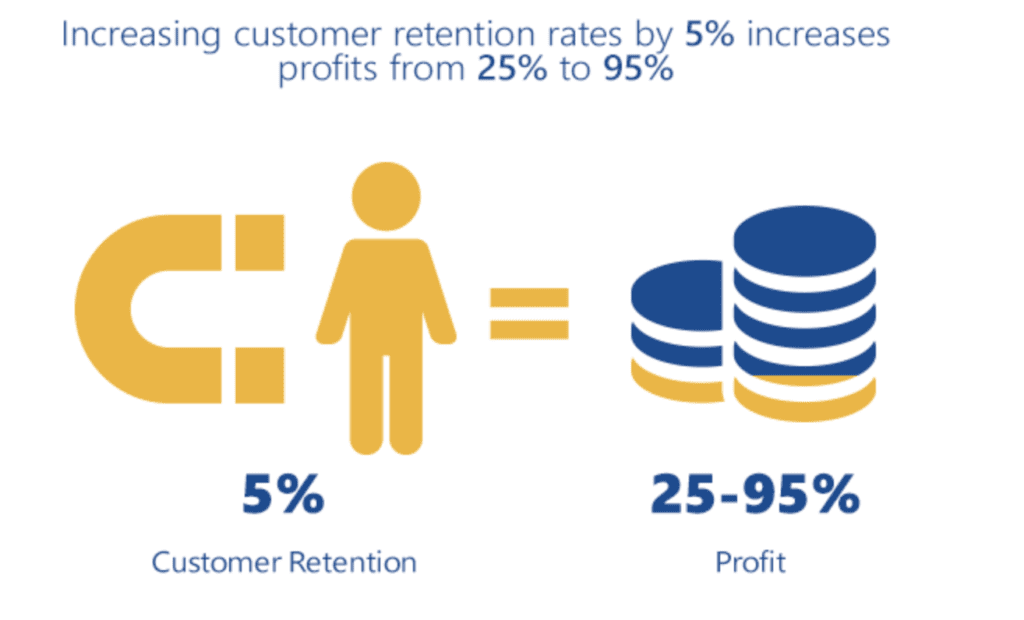
It’s also much easier to cross-sell or upsell your existing clients compared to selling to a new client.
Maybe your agency offers other services. You can take one of your app development customers and sell them your social media marketing services or SEO services. Or you can convince your mobile app development customers to upgrade their plan to a higher pricing tier.
Conclusion
If your mobile app reseller program isn’t going as well as you thought it would, don’t get discouraged. You’re not doomed—you just need to identify the problems you’re having.
Use this list of the ten most common reasons why your app reseller program isn’t working. Follow the tips and best practices that I’ve highlighted to help you fix those problems.
If the platform itself is holding you back, you should seek an alternative solution. The BuildFire reseller platform has everything you need to succeed. Check this reseller case study to see how other agencies have benefited from this program.